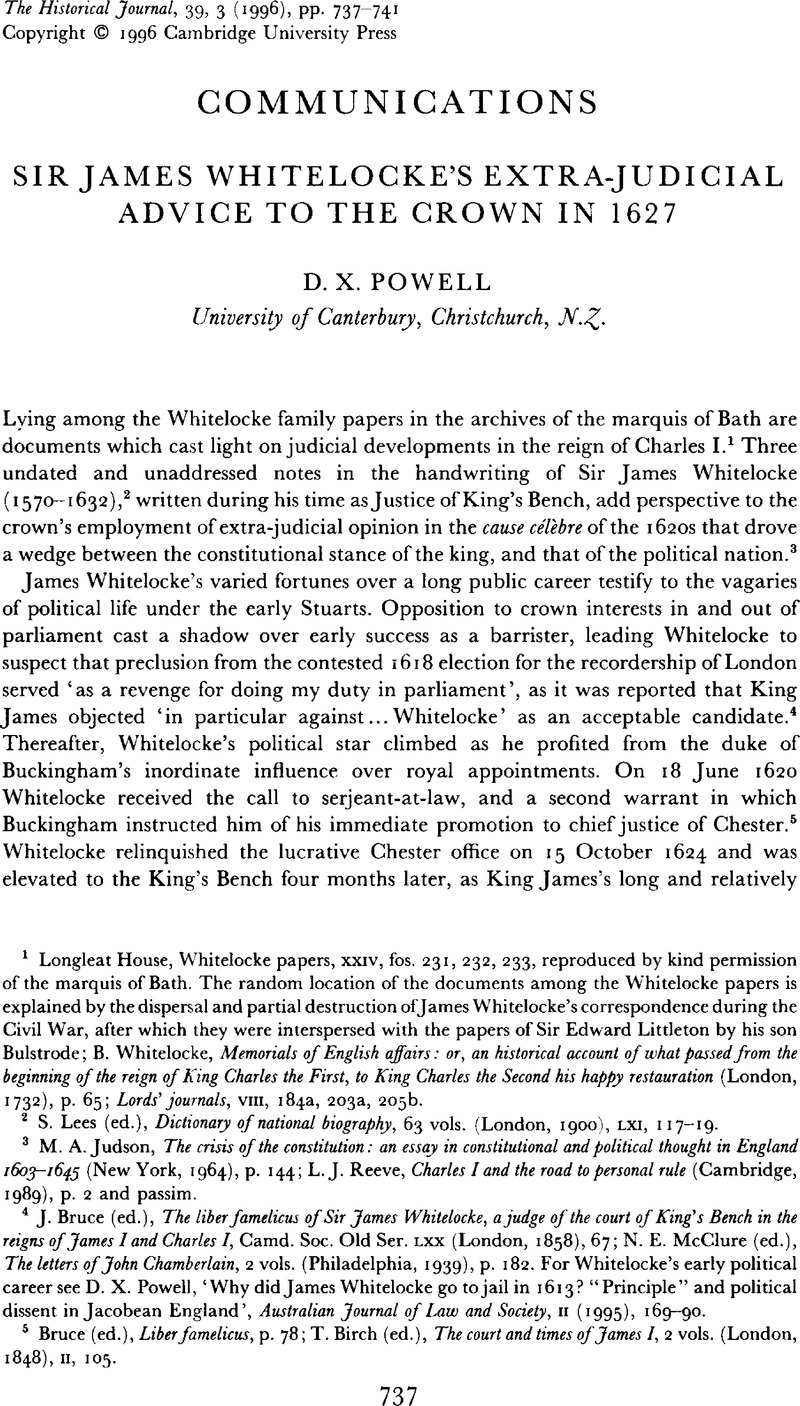No CrossRef data available.
Published online by Cambridge University Press: 11 February 2009

1 Longleat House, Whitelocke papers, XXIV, fos. 231, 232, 233, reproduced by kind permission of the marquis of Bath. The random location of the documents among the Whitelocke papers is explained by the dispersal and partial destruction of James Whitelocke's correspondence during the Civil War, after which they were interspersed with the papers of Sir Edward Littleton by his son Bulstrode; Whitelocke, B., Memorials of English affairs: or, an historical account of what passed from the beginning of the reign of King Charles the First, to King Charles the Second his happy restauration (London, 1732), p. 65Google Scholar; Lords' journals, VIII, 184a, 203a, 205b.
2 Lees, S. (ed.), Dictionary of national biography, 63 vols. (London, 1900), LXI, 117–19.Google Scholar
3 Judson, M. A., The crisis of the constitution: an essay in constitutional and political thought in England 1603–1645 (New York, 1964), p. 144Google Scholar; Reeve, L. J., Charles I and the road to personal rule (Cambridge, 1989), p. 2 and passim.CrossRefGoogle Scholar
4 Bruce, J. (ed.), The liber famelicus of Sir James Whitelocke, a judge of the court of King's Bench in the reigns of James 1 and Charles I, Camd. Soc. Old Ser. LXX (London, 1858), 67Google Scholar; McClure, N. E. (ed.), The letters of John Chamberlain, 2 vols. (Philadelphia, 1939), p. 182Google Scholar. For Whitelocke's early political career see Powell, D. X., ‘Why did James Whitelocke go to jail in 1613? “Principle” and political dissent in Jacobean England’, Australian Journal of Law and Society, II (1995), 169–90.Google Scholar
5 Bruce, (ed.), Liber famelicus, p. 78Google Scholar; Birch, T. (ed.), The court and times of James I, 2 vols. (London, 1848), II, 105.Google Scholar
6 Bruce, (ed.), Liber famelicus, p. 97Google Scholar; Russell, C. S. R., Parliaments and English politics 1621–1629 (Oxford, 1979).CrossRefGoogle Scholar
7 Cust, R., The forced loan and English politics, 1626–1628 (Oxford, 1987), pp. 6, 150.Google Scholar
8 Birch, T. (ed.), The court and times of Charles I, 2 vols. (London, 1848), I, 280Google Scholar; Cust, , Forced loan, p. 61Google Scholar. The writ for Sir John Heveningham to appear in court, dated 15 November 1627, survives in the Whitelocke papers, III, fo. 152V.
9 [Anon], The soveraigns prerogatiue and the subjects privilege, comprised in several speeches, cases, and arguments of law discussed between the late King Charles and the most eminent persons of both houses of parliament (London, 1658), p. 147.Google Scholar
10 Keeler, M. F., Cole, M. J. and Bidwell, W. B. (eds.), Proceedings in parliament 1628, 5 vols. (New Haven, 1977–1983), V, 219–20.Google Scholar
11 Whitelocke papers, XXIV, fo. 231. Original spelling has been retained; capitalization is modernized and where necessary punctuation has been added to clarify meaning.
12 The soveraigns prerogatiue, p. 147.Google Scholar
13 Guy, J. A., ‘The origin of the Petition of Right reconsidered’, Historical Journal, XXV (1982), 295–6.Google Scholar
14 Guy, , ‘The origin of the Petition of Right reconsidered’, p. 297.Google Scholar
15 Keeler, et al. (eds.), Proceedings in parliament 1628, V, 220.Google Scholar
16 Lords' journals, I, 740.
17 Guy, , ‘The origins of the Petition of Right reconsidered’, p. 301Google Scholar; cf. Russell, , Parliaments and English politics 1621–1629, p. 364.Google Scholar
18 Obviously the provenance of these documents is of the greatest importance. Unfortunately, they bear no official identification, no date, and cannot be correlated with an official record that I am aware of. They must be compared with other questions sent to the judges on the king's rights in cases of arbitrary imprisonment before Charles's assent to the Petition of Right, with Sir Robert Heath's questions to the judges on Eliot's case, and with Charles's own questions to the judges on his right to prosecute the prisoners; Gardiner, S. R., History of England from the accession of James I to the outbreak of Civil War 1603–1642, 10 vols. (London, 1883–1884), VI, 294–5, VII, 89–90Google Scholar; Rushworth, J., Historical collections of private passages of state, weighty matters in law, remarkable proceedings in five parliaments, 8 vols. (London, 1659–1701), I, 663–4Google Scholar; SP 16/141/144; SP16/105/94.
19 Whitelocke papers, XXIV, fo. 232.
20 Whitelocke papers, XXIV, fo. 233.
21 Howell, T. B. (ed.), A complete collection of state trials, 34 vols. (London 1809–1828), III, col. 27.Google Scholar
22 Howell, (ed.), State trials, III, col. 42.Google Scholar
23 Howell, (ed.), State trials, III, col. 57Google Scholar. Brief notes taken by Whitelocke on habeas corpus survive in the Whitelocke papers, 111, fos. 155V, 176V.
24 Keeler, et al. (eds.), Proceedings in parliament 1628, V, 220.Google Scholar
25 Tanner, J. R., English constitutional conflicts of the seventeenth century (Cambridge, 1962), pp. 38–9.Google Scholar
26 Coke, E., The third part of the institutes of the laws of England (London, 1628), p. 29Google Scholar, ‘Petit treason’.
27 Ruffhead, O. (ed.), Statutes at large, 10 vols. (London, 1786), I, 239, 241.Google Scholar
28 Spedding, J., Ellis, R. L. & Heath, D. D. (eds.), The works of Sir Francis Bacon, baron of Verulam, Viscount St Alban, and lord high chancellor of England, 14 vols. (London, 1858–1874), X, 101.Google Scholar
29 Whitelocke, , Memorials of English affairs, p. 13.Google Scholar
30 Howell, (ed.), State trials, XXX, col. 79.Google Scholar
31 Rushworth, , Historical collections, IV, 23Google Scholar. See also Chief Justice Finch's comments to the house of commons on extra-judicial opinion, quoted in Jones, W. J., Politics and the bench: the judges and the origins of the English Civil War (London, 1971), p. 193.Google Scholar
32 Cf. Gardiner, , History of England, IX, 105Google Scholar; Morrill, J. S., ‘The religious context of the English Civil War’, Transactions of the Royal Historical Society, 5 ser., XXXIV (1984), 162Google Scholar; Mendle, M.J., ‘Politics and political thought 1640–1642’, in Russell, C. S. R. (ed.), The origins of the English Civil War (London, 1973), p. 221.Google Scholar